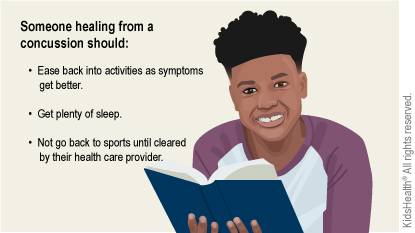Your child has a concussion and was cared for in the hospital. A concussion is a brain injury that leads to symptoms such as headache, dizziness, and confusion. With rest and a gradual return to school and regular activities, symptoms usually go away within a few days to a month. But if the injury was severe or if this is not your child's first concussion, it may take longer.
Follow these guidelines to care for your child at home and help them return to regular activities.

Each person with a concussion heals at their own pace. It's important to find a balance between doing too much and doing too little. If your child has other injuries, they may need more time to heal. Your health care provider can help you create a plan that works for your child.
In general, help your child follow these steps:
- Rest (for 1–2 days after the concussion)
- Have your child relax at home. Calm activities such as talking to family and friends, reading, drawing, coloring, or playing a quiet game are OK. If symptoms interfere with an activity, your child should take a break from it. They can try it again later that day or the next day, or try a less intense version of it.
- Your child should avoid or cut down on screen time. Video games, texting, watching TV, and using social media are likely to cause symptoms or make them worse.
- Don't let your teen drive.
- Be sure your child avoids all sports and any activities (like rough play, or riding a bike or skateboard) that could lead to another head injury.
- Help your child get plenty of sleep. They should:
- Keep regular sleep and wake times.
- Avoid screen time or listening to loud music before bed.
- Avoid caffeine.
- Nap during the day, as needed.
- For the first few days after the injury, if your child has a headache and your health care provider says it's OK, your child can take acetaminophen (Tylenol® or a store brand) or ibuprofen (Advil®, Motrin®, or a store brand).
- Light Activity (usually within a few days to a week after the concussion)
- Your child can slowly try more activities, such as going for a walk or watching TV. If symptoms interfere with an activity, your child should take a break from it. They can try it again later that day or the next day, or try a less intense version of it.
- After a few days, your child should feel well enough to return to school. Work with your health care provider and a school team to create a plan for your child's return to school. Your child may need to start with a shorter day or a lighter workload. If your child is not back in school by 5 days after the concussion, call your health care provider.
- Don't let your teen drive until your health care provider says it's OK.
- Be sure your child continues to avoid all sports and any activities that could lead to another head injury.
- Make sure your child continues to get plenty of sleep.
- If your child still needs medicine for headaches, talk to your health care provider.
- Moderate Activity (usually about a week after the concussion)
- If symptoms are nearly gone, your child can go back to most activities, including regular schedules for school and work.
- Be sure your child continues to avoid all sports and any activities that could lead to another head injury.
- If symptoms interfere with an activity, your child should take a break from it. They can try it again later that day or the next day, or try a less intense version of it.
- Regular Activity (usually within a month of the concussion)
- If all symptoms from the concussion are gone, your child can go back to all activities, except sports.
- For sports, your health care provider will work with your child's coach and athletic trainer (if available) to create a clear, written plan for a gradual return to play. Don't let your child go back to playing sports until your health care provider says it's OK.

What symptoms should I watch for? Symptoms of a concussion might happen right after the head injury or develop over hours to days. Your child may:
- have a headache
- be confused
- be dizzy
- have vision changes
- have nausea and/or vomiting
- feel very sleepy
- have sleep problems
- have learning problems
- feel anxious or sad
You know your child best. If you see symptoms that concern you, talk to your health care provider.
What could happen if my child goes back to sports too soon after the concussion? Going back to sports too soon can make the concussion take longer to heal. It also puts your child at risk for another concussion. Getting more than one concussion in a short time can cause serious, permanent brain damage.
How can we prevent another concussion? Because most concussions in kids are from sports injuries:
- Be sure that any team your child is on has rules to lower the risk of concussions, such as limits on tackling (football) or heading the ball (soccer).
- Be sure your child wears a helmet when skiing, snowboarding, biking, riding a scooter, skateboarding, or rollerblading. A concussion can still happen when your child wears a helmet, but the helmet can protect them from a skull fracture and more serious brain injury.
A child who has a head injury needs to stop what they're doing and get medical care right away. Kids should never ignore symptoms or try to "tough it out."
Where can I get more information? Find more information on concussions, return to school, and return to play at cdc.gov/headsup.




